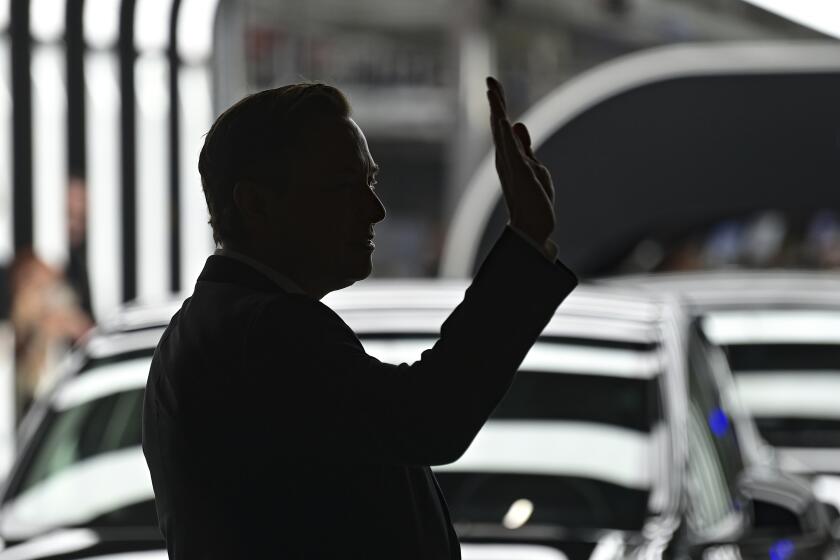Tesla posts record profit but warns of supply-chain stress

Tesla Inc. reported better-than-expected first-quarter results, buoyed by strong demand for its electric vehicles, but warned of supply chain challenges for the rest of the year.
The first major U.S. automaker to report financial results for the first three months, Tesla easily beat estimates with a record profit. It cautioned that production remains constrained by shortages of key components, a common refrain for automakers because of global bottlenecks on supplies of semiconductors and other parts.
“Our own factories have been running below capacity for several quarters as supply chain became the main limiting factor, which is likely to continue through the rest of 2022,” it said in a letter to shareholders.
But the Austin, Texas, company posted strong gains in profit and revenue for the first three months, including the sale of regulatory credits totaling $679 million — more than double the amount in the previous quarter. Tesla has generated billions through credit sales that enable other automakers to comply with stricter emissions regulations.
“It’s a big number, and it speaks to where the rest of the auto industry is when it comes to selling EVs in high volumes,” said Gene Munster, managing partner at Loup Ventures. “They are still behind” Tesla, he said.
Shares of Tesla were down 5% at $977.20 at the close in New York but rose as much as 5.3% in after-hours trading.
Although Tesla is still by far the world’s most-valuable auto company, with a market capitalization of $1.01 trillion, the shares have declined 7.5% this year amid concerns about global shortages of key parts. But the company has fared better than bigger-volume rivals, such as General Motors Co. and Ford Motor Co., whose shares are down 29% and 23%, respectively.
How seriously should we take Elon Musk’s rhetoric about bringing free speech and transparency to Twitter? Rather than parse his words, let’s look at his past actions.
Profit at Elon Musk’s electric-vehicle and clean-energy company totaled $3.3 billion, or $3.22 a share, excluding some items, the automaker said Wednesday. That beat the $2.27 average of analysts’ estimates. Revenue rose to $18.8 billion, compared with estimates of $17.9 billion.
A COVID-19 lockdown in Shanghai forced its factory to halt output, crimping production in China. “Although limited production has recently restarted, we continue to monitor the situation closely,” Tesla said.
The global EV market leader is expanding on three continents, with new factories in Austin and Berlin alongside existing plants in California and Shanghai. It delivered more than 936,000 vehicles last year and reported deliveries of 310,048 vehicles worldwide in the first quarter. The company said it’s still projecting 50% annual growth.
Tesla continues to add to a growing war chest: It finished the first three months with $18 billion in cash and cash equivalents. It also continues to chip away at its debt load, carrying less than $100 million in debt at the end of the quarter, excluding financing for its vehicle and energy products.
Also on Wednesday, Musk defeated an attempt by investors suing over his 2018 tweet about taking Tesla Inc. private to make him stay quiet about the case until it goes to trial next year.
The investors “failed to make a satisfactory showing” that an order restricting Musk’s public commentary is required or warranted, a federal judge ruled.
The shareholders asked the judge to order restrictions on Musk’s commentary after he publicly complained at a TED talk that he was “unlawfully” forced to settle a 2018 U.S. Securities and Exchange Commission lawsuit over the same tweet that’s at the heart of the San Francisco case headed for trial in January.
The investors said the billionaire’s comments threatened to “taint” the jury that will eventually decide whether he committed fraud.
Musk argued that such an order would trample his rights to free speech under the U.S. Constitution.
U.S. District Judge Edward Chen agreed with Musk’s argument that the comments investors found objectionable wouldn’t reach the millions of potential jurors in the case. Jurors will be drawn from a large, populous, metropolitan community, Chen said.
Chen also acknowledged for the first time that he had concluded Musk’s tweet about taking Tesla private with “funding secured” was false. The judge’s ruling on that issue remains publicly unavailable but has been cited by investors in court filings.
Bloomberg writer Joel Rosenblatt contributed to this report.







